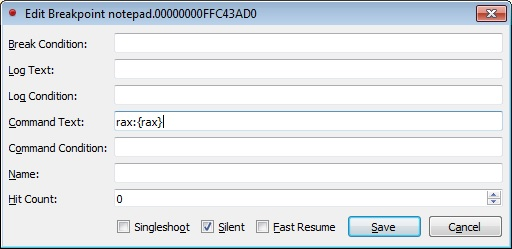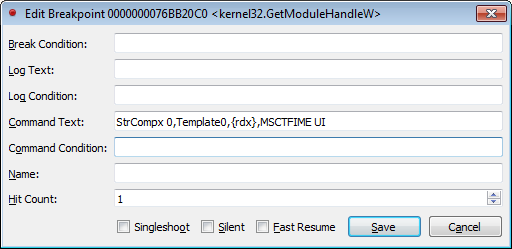just a try to add more feature's to x64dbg script system
////////////////////////////////////////////////////////////////////////////
- version 2.0:
1-all numbers are hex numbers.
2-more nested in arguments.
3-Build bridge to make plugin system Compatible with x64dbg script system.
4-create parallel Functions to x64dbg Functions, like ( cmp >> cmpx ).
5-rename new name (Varx Getx Setx) and fix array index entry.
6-add VarxClear ( clear all variable to help user in test's ) , memdump with print style.
- version 1.6:
1- add Parser system to recognize arguments.
2- begin build Script system.
3- add more Helper Functions.
- version 1.4:
1- make StrCompx in separate Thread and add Sleep time to wait x64dbg to finish process.
2- Fix Hex2duint function add length check in case it less than 2 .
- version 1.3:
1- Add another argument to cbLogxJustAtBP for printing on LogxWindow.
2- now it accept bool argument like this (true/false-on/off-1/0).
3- add StrComp_BP function for compare string in memory at BP.
4- compiled x32.
////////////////////////////////////////////////////////////////////////////
-arguments value system (AVS): all argument pass through Parser system recognizer,how it work:
1- all numbers are in hex shape ( setx $x,50 == setx $x,0x50).
2- search for all {} which is releated x64dbg system and try to resolve it.
3- search for all $ which it's related to defined variables of AdvancedScript and resolve it.
4- search for all tokens by order ( * / + -) and resolve it.
5- all numbers in int variables are saved as decimal, put when it printed it print with
two way hex and decimal.
6- all numbers which stored in str or array var are heximal.
7- when define variables no need to use $, but wher ever you use this var you should add $ first.
8- when calulate int value all arguments will converted to int and make the formula exist.
9- when calulate str or array all arguments are set to gather after it calculate it's value's.
10- when we define array it will create array with 0x500 elements.
it's Like Var in x64dbg system, for defining variable's which can used in Script commands.
Parameter:
Varx P1, P2 , P3(optional)
P1: variable type it holde ( str , int , array ) /// array is defined with 500 elements.
P2: variable name it should not have spaces or begin with $ ,
>>>>>>but when resolve it's value it should add $ before it.<<<< like this $x >> value of x
P3: the value of the variable it's optional for str and array only and the value will be null
for int type it should be have a value and must be int
note : you can use variable for this arguments like $x or {rax}.
no need to use ""
Variable type is :
- int: all value will saved as int value.
- str.
- array with 0x500 string elements ( it's just string).
sample :
- varx int, x, 90
- varx array, y, 1
- varx str, x, {rax}
- varx array, y
- varx str, x
//////////
- varx int, x, 0x45fa
- varx int,x1,25+30 /// 0x55 /85
- varx array, z,30
- setx $z[10],test
- varx int,x2,$x +$x1+$z[0]
set value to the virables in AdvancedScript vriable system or x64dbg system. you can make add sub or multi or divide and you can nested arguments as you like.
Parameter:
Setx P1, P2
P1: variable name, it must (not) begin with $, because we need to assigned new value .
for the array variable we use [Array_index] , no need this for int and str or Array_index=0
array_index can accept variable's value
P2: the value of the variable can used AVS, no need to use "".
sample :
- varx int, x, 90 x=0x90
Setx x,10 x=0x10
- varx str, x, {rax} x=rax value
Setx $x,test x=test
varx array,z,10 z[0]=10 because all elements are string
setx $z[5],$x$z[0] z[5]=test10
setx $z[5],$x $z[0] z[5]=test 10
setx $z[5],$x+$z[0] z[5]=test+10
setx $x,$z[0] x=0x10
setx $x,$z[5] wrong value can't converted to int
- varx int, x, 0x45fa int x= 0x45FA\17914 :has been added
varx str, z, 0xaa str z= 0xaa :has been added
setx $x, $z + 0x33 - 25 x= 0xB8\184
varx array, y, 0x10 array y[0]= 0x10 :has been added
setx $x, $x + $y[0] x= 0xC8\200
print the value of the virables .
Parameter:
SetVarx P1, P2
P1: variable name, it must begin with $, because we need to get the value .
for the array we put [array_index] if not used then it will print first
element in the array.
array_index can accept variable's value
the value of the variable can used AVS, no need to use comma "".
sample :
- varx int, x, 90 x=0x90
SetVarx $x,10 x=0x10
getx $x x=0x10
- varx str, x, {rax} x=rax value
getx $x x=rax value
-varx int, x, 10 int x= 0x10\16 :has been added
varx array, y, 1 array y[0]= 1 :has been added
setx $y[$x], 110 y[10]= 110
getx $y y[0]= 1
getx $y[$x] y[10]= 110
it's collection of edit functions from x64dbg system, but it accept variables in the parameter.
- (Movx , addx , subx , mulx , divx , andx , orx , xorx , shlx ) : first parameter will not analyzed, just the second one.
- (pushx , popx):parameter will analyzed
- cmpx : both parameter will analyzed
sample :
- again:
varx str,base,{rax}
cmpx {rax},$base >>> cmpx analyzed both parameters so we can write like this
jne done
jmp again
done:
- varx int,x,20
varx int,y,0xFF
var z >>> this var from x64dbg system
addx rax,$x+$y rax =rax + 0x32+ 0x255 = rax + 0x287
addx z,$x+$y z=z+0x287
it's same findallmem in x64dbg system, but it accept variables in the parameter.
Parameter:
SetVarx P1, P2, P3
P1: The address to start searching from.
P2: The byte pattern to search for. This byte pattern can contain wildcards (?)
for example: EB0?90??8D
P3: The size of the data to search in. Default is the entire memory map..
>>all variable can used AVS<<
sample :
- varx str, search, "4533C94533C033" << or >> varx str, search, 4533C94533C033
varx str, base, { rdx }
findallmemx $base, $search
mov rdi, ref.addr(0)
dump memory to log window like windbg style
//00007ff8`02f42280 cc c3 cc cc cc cc cc cc - 0f 1f 84 00 00 00 00 00 ................
//00007ff8`02f42290 cc c3 cc cc cc cc cc cc - 0f 1f 84 00 00 00 00 00 ................
Parameter:
SetVarx P1, P2, P3
P1: The address to start dump.
P2: size of data
sample :
- memdump 00000000FF613570,50
00000000FF613570 4883EC28E807FEFFFF4883C428EB1190 H?�(�����H?�(��.
00000000FF613580 90909090909090909090909090909090 ................
00000000FF613590 488974240848897C241041544881ECB0 H?t$�H?|$�ATH���
00000000FF6135A0 0000008364242000488D4C2440FF157D ...?d$ .H�L$@��}
00000000FF6135B0 8C00009065488B042530000000488B78 ?...eH?�%0...H?x
- memdump {cip},50 {cip}= rip address
-varx str,address,{cip}
varx str,size,20
memdump $address,$size
clear all variable's rest variables list , so we can add again same var Good for maintenance.
sample :
- VarxClear
////////////////////////////////////////////////////////////////////////////
Enable user to Log Just At BP or HW-BP so the Log window will contain the Value's you log, nothing else.
ofc you have to set the Log at Edit BreakPoint Dialog,Like this:
using:
LogxJustAtBP true,true /// Log at BreakPoints on both Log window ( x64dbg and LogxWindow)
LogxJustAtBP false,false /// Log as defaults
you can use another way to set the arguments Like :
LogxJustAtBP on,on or LogxJustAtBP 1,1
LogxJustAtBP off,off or LogxJustAtBP 0,0
note: use the last version of x64dbg.
//////////////////////////////////
Show Template window which enable u to define many template you want to used it later at BP or At tracer.
it anable you to save and rename and delete template edit Template.
note : Template Folder will be in the x64dbg folder root as LogTemplate.
No parameters needed.
//////////////////////////////////
Show Additional log window which log data from Logx Function it just for help to see log
when u want without extra info .
No parameters needed
//////////////////////////////////
useding to log by defined Template so you can used at command line direct, or you can put it at BP dialog to
log as defined Template .
usage:
logx TemplateName /// Template name should define in LogxTemplateManager
//////////////////////////////////
this used as a Tracer to log as defined template using step triger ( F7 , F8 )
it will log direct to a file at LogTrace Folder as the name it define.
note : Trace Folder will be in the x64dbg folder root as LogTrace.
usege :
logxTrace P1,P2,P3
P1 : on or off // (on:Enable tracer, need to enter (P2 & P3) , (off:disable Tracer , no need P2,P3).
P2: Template Name should be define in LogxTemplateManager.
P3: Trace file name ( it will created in LogTrace folder and it will be as Text file).
sample:
logxTrace off
logxTrace on,Template0,test
////////////////////////////////////////////////////////////////////////////
used at the command of BP dialog to get the string at the address of memory , this Function use
Contains compare so no need to write all string it's enough to write part of it and function will
find it.
Parameter:
StrCompx P1, P2 , P3 , P4
P1: resume after hit the BP (true/false - on/off - 1/0). 1: contiue , 0: stop
P2: log Template name ,it should defined in the LogxTemplateManager.
P3: memory Address which hold the string if it's number then no problem, if it's string
(like [rsp+4]) it should follow x64dbg string format
P4: UserString2Compare u can put any string you want but it should not contain ,
sample:
StrCompx 0,t1,{[esp+4]},x32dbg // t1 name of the template
StrCompx 1,Template0,{rdx},MSCTFIME UI
//////////////////////////////////




